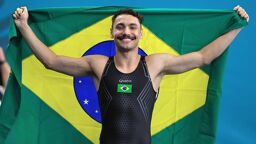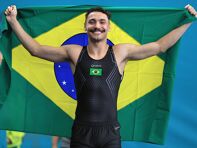The New Zealand Olympic Committee announced Monday that weightlifter Laurel Hubbard, a transgender woman, will be a part of New Zealand’s weightlifting squad for next month’s Summer Olympics in Tokyo.
The shy, reticent Hubbard rarely grants interviews or makes public statements. She did comment Monday, noting that her country pulling together through the difficulty of the global pandemic pushed her further toward this goal.
“The last 18 months has shown us all that there is strength in kinship, in community, and in working together towards a common purpose,” Hubbard told reporters about the selection. “The mana of the [New Zealand symbol] silver fern comes from all of you and I will wear it with pride.”
This selection is a summit in what has been a long climb for Hubbard. She was once an up-and-coming youth and junior talent who left the sport citing the inner turmoil surrounding her gender identity as a major factor.
She returned to weightlifting after starting her gender transition in 2013 and became eligible under International Wrestling Federation regulations by 2015.
Her breakthrough came at the 2017 IWF World Championships in Anaheim, California. Hubbard earned two silver medals in the women’s 90+ kg classification, became the first trans athlete reach the podium at an individual Olympic sport world championship, and earned her nation’s first world championship medals in weightlifting.

During a lift at the 2018 Commonwealth Games in Australia, she gruesomely injured her arm. Photos caught the exact moment when the arm gave way. Some thought her athletic career would be forced to end. Instead, she fought back to rehab the injury over that next year and made it back to the IWF World Championship in 2019 and rallied to a sixth place finish. More recently, she won at the Weightlifting World Cup in Rome in January 2020.
The head of New Zealand’s governing body for weightlifting noted how much Hubbard had fought through and how she fought back.
“Laurel has shown grit and perseverance in her return from a significant injury and overcoming the challenges in building back confidence on the competition platform,” Weightlifting New Zealand President Richie Patterson stated to Radio New Zealand.
“Laurel is an astute student of the sport and technically very good with the lifts. We look forward to supporting her in her final preparations towards Tokyo.”
Along with support have come barbs from some competitors, along with the usual peanut gallery of anti-trans commentators, concern trolls, wannabe sports scientists and clickbait websites.
The vitriol has intensified the closer Hubbard has gotten to qualifying for the upcoming Games. It reached a fever pitch in May, when the IWF revised qualification rules as an adaptation to the disruption of the last year due to the Covid-19 pandemic. The revisions placed Hubbard firmly in the field, and they brought out another wave of transphobia directed toward her.
The head of the New Zealand Olympic Committee made a firm rebuttal in standing up for one of their athletes.
“As well as being among the world’s best for her event, Laurel has met the IWF eligibility criteria including those based on IOC Consensus Statement guidelines for transgender athletes,” NZOC CEO Kereyn Smith said to Radio New Zealand.
“As the New Zealand Team, we have a strong culture of manaaki and inclusion and respect for all,” Smith continued. “We are committed to supporting all eligible New Zealand athletes and ensuring their mental and physical well-being, along with their high-performance needs, while preparing for and competing at the Olympic Games are met.”

That inclusive culture shines even brighter in the lifters that will wear New Zealand black on the platform. These Olympics will be the first for each member of the five-person contingent that will be sent. All of them chosen specifically on a demanding criterion. To make Team New Zealand in an individual sport, a hopeful must of demonstrate that they can finish in the Top 16 in their event at the Olympics.
Hubbard will be at the center of the attention for this group of newbies. At age 43, she’s the oldest of the bunch. She’s experienced a career’s worth of ups and downs in a space of four years and has faced derision just to take her place on the lifting platform.
She told reporters what has kept her focused was the uplift she’s received across her country. “I am grateful and humbled by the kindness and support that has been given to me by so many New Zealanders,” Hubbard said. “When I broke my arm at the Commonwealth Games three years ago, I was advised that my sporting career had likely reached its end. But your support, your encouragement, and your aroha (love) carried me through the darkness.”
Hubbard joins American Chelsea Wolfe as out transgender athletes who made an Olympic roster for the upcoming Games. Wolfe, a BMX freestyle specialist, was placed on the U.S. team as an alternate and would compete if one of the two designated Team USA competitors in her event was injured.







































